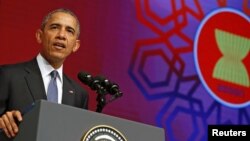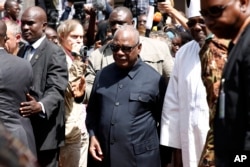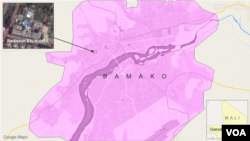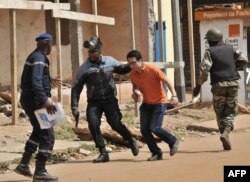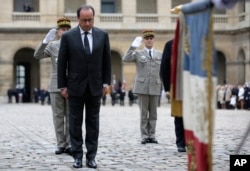U.S. President Barack Obama has condemned what he called the "appalling" terrorist attack at a hotel in the capital of Mali that left at least 21 people dead, and he vowed “relentless” pursuit of the killers.
Speaking at a summit of regional leaders in the capital of Malaysia, Obama said the Friday assault in Bamako would only stiffen U.S. resolve to combat terrorism.
“Like the heinous attacks we saw in Paris and attacks we see all too often elsewhere, this is another awful reminder that the scourge of terrorism threatens so many of our nations,” said Obama in Kuala Lumpur while attending the annual meeting of the Association of Southeast Asian Nations (ASEAN).
Friday's assault came a week after militants killed 130 people in gun and bomb attacks in Paris claimed by the Islamic State group, and three weeks after a Russian airliner was downed over Egypt's Sinai Peninsula by what Moscow and Western governments say was a bomb, killing 224 all people aboard.
Obama said the U.S., allies and partners were determined to protect their citizens, push back on the “hateful ideologies that fuel this terrorism” and root out terrorist networks.
Two West African militant groups — al-Qaida in the Islamic Maghreb (AQIM) and its affiliate, El Mourabitoune — claimed joint responsibility for the attack. A U.S. defense official called AQIM the "leading suspect" in the assault.
Several Malians were among those killed, as were six Russians, three Chinese, two Belgians, a Senagalese, an Israeli and an American. The American has been identified as international aid worker Anita Datar.
Malian special forces
In addition to hostages killed, two gunmen also died when Malian special forces conducted a floor-to-floor search to clear the hotel, according to Malian officials.
A reporter for VOA from Bamako said it wasn't clear whether there was a third gunman in the attack. She said forensic investigators were at work inside the hotel Friday evening.
Earlier reports said the gunmen had taken up to 170 hostages and that only 80 had been released. The reason for the discrepancy could be that some hotel guests escaped on their own and have not been accounted for.
Mali's President Ibrahim Boubacar Keita, who cut short a visit to Chad to return to Bamako on Friday, declared a state of emergency and three days of mourning in the West African nation.
In remarks broadcast on state television, Keita said the government would do everything it could "to eradicate terrorism in Mali."
Saturday, Keita visited the scene of the attack. Speaking to reporters gathered outside the Radisson Blu hotel, Keita said that Mali cares about people’s lives and “will do everything we can to protect them, but everybody also has to be watchful."
Keita said he had received full support from France and the international community after the attack in Bamako.
Investigation
Malian security forces were hunting "more than three" suspects, according to sources close to the case.
The Radisson is a popular hotel for foreigners and was reportedly hosting delegates to Malian peace talks. Witnesses said gunmen entered the hotel in a car with diplomatic license plates early Friday morning, then went room to room seeking victims.
"When it started, I thought that it was firecrackers. But it went on and on," one hotel guest told VOA's French to Africa service. "We heard the alarm from the hotel and I even went out of my room ... but I noticed a lot of smoke in the hallway. I went back to my room and the Malian soldiers came, knocked on the door, took a small group of us out."
Malian special forces spent several hours going through the 190-room hotel, rescuing guests and tracking down the gunmen. Both of the deceased gunmen were killed by security forces.
U.N. peacekeepers stationed in Mali helped with the operation, while a number of French troops and two American military personnel assisted outside the hotel.
Condemnation from abroad
Besides the U.S., condemnation also came from U.N. Secretary-General Ban Ki-moon and French President Francois Hollande.
Hollande is scheduled to meet with Obama in Washington in the coming days to discuss stepping up France’s contribution to the U.S.-led effort to counter Islamic State militants in Syria and Iraq.
White House deputy security adviser Ben Rhodes said there was “a greater sense of urgency to do more” following the terror attacks in Paris this month. U.S. security officials have said the Islamic State group apparently was behind the bloodshed there.
The Economic Community of West African States (ECOWAS) condemned the terrorist attack in Bamako and expressed condolences to the families of the victims and to the government and people of Mali.
Remi Ajibewa, director of political affairs at the ECOWAS Commission, said Friday’s attack constituted a serious threat to the peace process and stability in Mali. ECOWAS remains resolute about ensuring that the region is rid of terror and is safe for all citizens, he added.
The regional bloc has adopted a two-pronged counterterrorism strategy, with an emphasis on human security. Ajibewa said ECOWAS had teamed up with the Economic Community of Central African States (ECCAS) to combat terrorism in the two regions.
Ajibewa also called on members of ECOWAS to ensure vigilantes in the countries are disarmed, rehabilitated and reintegrated into society.
The attack in Mali underscores the threat posed by Islamist militants who remain active in northern and central Mali despite the presence of U.N. peacekeepers.
A French-led military force ousted Islamist groups from power in northern Mali in 2013. The groups had seized power in the north after a military coup in Bamako in 2012.
An attack in the capital in March on a restaurant popular with tourists killed five people.
Isabela Cocoli and William Gallo in Washington contributed to this report.




